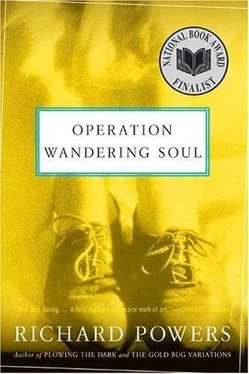Richard Powers - Operation Wandering Soul
Здесь есть возможность читать онлайн «Richard Powers - Operation Wandering Soul» весь текст электронной книги совершенно бесплатно (целиком полную версию без сокращений). В некоторых случаях можно слушать аудио, скачать через торрент в формате fb2 и присутствует краткое содержание. Год выпуска: 2002, Издательство: Harper Perennial, Жанр: Современная проза, на английском языке. Описание произведения, (предисловие) а так же отзывы посетителей доступны на портале библиотеки ЛибКат.
- Название:Operation Wandering Soul
- Автор:
- Издательство:Harper Perennial
- Жанр:
- Год:2002
- ISBN:нет данных
- Рейтинг книги:5 / 5. Голосов: 1
-
Избранное:Добавить в избранное
- Отзывы:
-
Ваша оценка:
- 100
- 1
- 2
- 3
- 4
- 5
Operation Wandering Soul: краткое содержание, описание и аннотация
Предлагаем к чтению аннотацию, описание, краткое содержание или предисловие (зависит от того, что написал сам автор книги «Operation Wandering Soul»). Если вы не нашли необходимую информацию о книге — напишите в комментариях, мы постараемся отыскать её.
Operation Wandering Soul — читать онлайн бесплатно полную книгу (весь текст) целиком
Ниже представлен текст книги, разбитый по страницам. Система сохранения места последней прочитанной страницы, позволяет с удобством читать онлайн бесплатно книгу «Operation Wandering Soul», без необходимости каждый раз заново искать на чём Вы остановились. Поставьте закладку, и сможете в любой момент перейти на страницу, на которой закончили чтение.
Интервал:
Закладка:
Panic rushed on Ricky like a monsoon. But just the way day's rain, for a minute as opaque as sheet tin, can vanish more rapidly than it blows in, his confusion cleared onto equatorial blue. He gave the first reply that came into his head: a colloquial phrase something like "I've already been." The abbot's slight smile implied that, if Ricky hadn't entirely passed the exam, he would be taken on as a promising exception.
Alone in the community, he was shown his cell — an open teak cube draped in mosquito netting, with a low prayer dais and a water barrel shared with three others. The youngest novices flocked around him until a senior monk chased the boys away. Ricky was taught how to put on and fold his robes. Then he was left to himself.
Right speech, right gesture, right countenance. No possessions. No food after noon. No singing, no music, no pictures, no broadcast. No leaving the compound except for barefoot dawn alms, receiving the day's food from merit seekers, out on the streets. He knew these rules but did not yet know what, aside from the common meal and the several chants, he was expected to do all day.
Nothing, everything. He could go for instruction with the senior monks. He could think or write. He could talk softly with the other boys during certain hours. He could meditate. The abbot gave him an English book on the subject from the monastery library. None of the other monks could read it, and the abbot was eager for a report on the contents.
This book— An Awareness of Air —started out as clear as the moon in a still water barrel, yet grew infinitely infolded with each rereading. Every line undid and rewove the previous opaline paradox. The plot was all about how to sit quietly and grow so mindful of breathing that you were once again oblivious. It said how to hold the hands, the neck, the body. But when the text described how to hold the thoughts, things grew slippery.
Meditation ascended by stages, like the tiers on his processional parasol. Align the spine, close eyes, focus on the thread passing through the lungs. Ricky reached detachment with a little effort, then went back to reading. Next came intense concentration. He breathed for a long time but was never sure whether he achieved the state or just thought he had. He returned to the book to learn that this was just a stage on the way to a more intense indifference. As the white light approached, he was supposed neither to shut it out nor give in, but to go through, to yet more things falling away. After days lost in the various positions, he drew close to the white light, but the excitement of approach dispersed the condition.
On the book's last page, he read how everything he had just read was worthless. Study and words were the worst enemy of the thing that all the study and words meant to nurture. He brought the book back to the abbot and reported how the work counseled its own destruction. Grinning and shaking his head, the abbot placed the volume back in its space on the shelves.
The boy breathed on in silence, now without trying for anything except respiration. His days were so free from distraction that he could not recall the urgency that had forced him here. An hour became fuzzy; the interval between two temple bell peals gaped grotesquely. In the silence of his cell, one day's tidal sine of light traced the rise and subsidence of whole existences. Once, in an afternoon lasting longer than belonging, he thought he was about to receive knowledge of his previous lives.
After a while, time ceased. Kraft Sr. came to check on the boy. Returning to conversation enough to anticipate how excruciating time would again be for several days after his father left, Ricky begged the man to stay overnight. But his father had work to attend to, the exploits of world political will.
Ricky enjoyed going into the abbot's study to stare at an image of the Enlightened, a dark ceramic of the man reclining full length, light with deliverance, resting his head on the crook of one arm. This statue was nothing like the thousands of Free treatments of the pose. Its was alien, other. The abbot told him the statue came from far away.
"How far?" the novice asked.
"Farther than you could walk in your life. And it is as old as it is distant."
"Older than I could walk to?" Ricky giggled, against the precepts. But the abbot quietly joined him.
"It is one of the earliest likenesses of the Enlightened in human form. Before that, artists only traced his emblems — his footprint, the tree."
"Why is it so strange?"
The abbot's lips tightened. "The first images were under the spell of the West. Half Hindu, half Roman."
"Is that true?" Ricky touched the reclining figure, finding in it another dislocated, crosstown soul.
"I don't lie to you! What do you like most about him?"
Ricky answered instantly. "The face."
"Heu." A sound that meant anything. "What about the face?"
"It's all opposites. He is smiling deeply, but…" The face of a thousand-year-old boy.
The abbot completed the unreachable thought. "But there is nothing in the world to smile about."
Ricky stared at the face's hurt bliss. "Is it valuable?" He hated the question as soon as it left him. The Blue Book value — its rarity — was more than the monastery buildings put together. He had meant to ask: Do others need this image as much as I do? But the idea had gotten lost on its way to the air.
The abbot did not reprimand him. "We use it."
The boy reached out to — what? — pet the statue, console it. But in a freak impulse, his hand shuddered. He tried to clip the flinch, but will was one step behind muscle. Even before the figure slipped from its shelf to pieces on the floor, the boy saw the irreversible and wished himself dead, floating lifeless above the earth's atmosphere.
The abbot, twenty years renouncing the illusion of things, cried out at the senseless shards, his shaved head blanching as pale as the white novice's. He said nothing, and the harshness ofthat silence cut the boy worse than the disaster.
Just months before Ricky had arrived, in a cell near his, an old monk had hanged himself. But the boy could find no place in the desert of ceiling to attach the end of a robe. He sat on the bare floor, refusing meals, forgoing prayers, unable even to close his eyes and listen to his breathing. All he allowed himself was to replay the event: Had the figure slipped before his hand twitched? No; he would not rewrite chronology. Had he wished to destroy the thing? Why?
Nothing made sense, least of all the impression that his spasm had responded to some summons from the childlike wrinkles of that face. In the instant just before he sent the figure crashing to the ground, he had heard someone — not the abbot, and certainly not the Enlightened — someone stretched out on the human cordwood pile, violently shouting from out of the hand-lit oven, "Come away!" And those words had burned a serial number into his arm, jerking it in fatal reflex.
The memory of the statue shattering dragged him around his room like a chained fighting cock. He confined himself in the cell until that afternoon when it became a choice of leave or asphyxiate. When he finally threw his door open, the force of sun blinded him like the bare bulb of an interrogation. He took an awkward step over the stoop into the forgotten place and almost tripped over a mass on his doorstep. He dropped to his knees and toyed with the thing as a caveman with first flint. It was the largest shard from the shattered statue.
Ricky took the fragment inside. Not the whole pile of permanent shame. Just this long, pristine surface, undulant as a sensuous seashell. He looked at the simple curve — once the swell of a reclining man's side as he awaited the last migration. After long looking, he made a decision. With a small knife blade and sewing needle lent him to mend his orange robe, he began working the stone surface. He searched below it for artifacts, brushing the pin tip back and forth like an archaeologist's whisk.
Читать дальшеИнтервал:
Закладка:
Похожие книги на «Operation Wandering Soul»
Представляем Вашему вниманию похожие книги на «Operation Wandering Soul» списком для выбора. Мы отобрали схожую по названию и смыслу литературу в надежде предоставить читателям больше вариантов отыскать новые, интересные, ещё непрочитанные произведения.
Обсуждение, отзывы о книге «Operation Wandering Soul» и просто собственные мнения читателей. Оставьте ваши комментарии, напишите, что Вы думаете о произведении, его смысле или главных героях. Укажите что конкретно понравилось, а что нет, и почему Вы так считаете.












